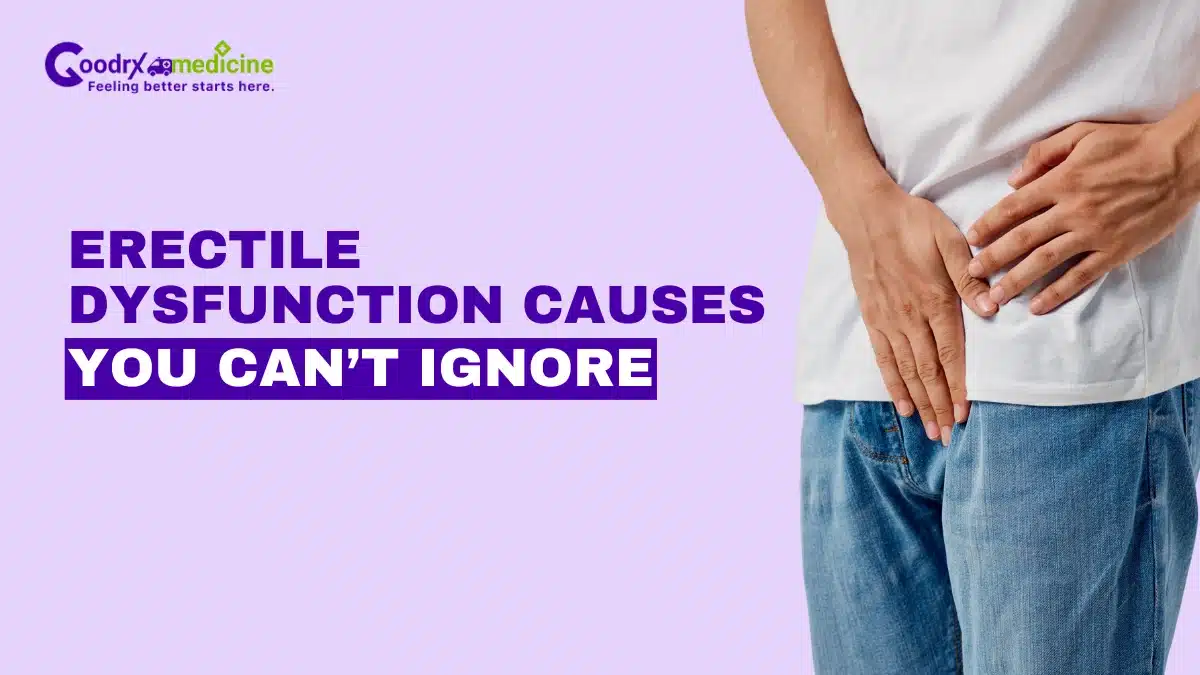Erectile Dysfunction, or ED, affects many men worldwide, often more than people realize. It occurs when physical conditions like Diabetes or heart disease, psychological stress, or unhealthy lifestyle habits interfere with the ability to achieve or maintain an erection.
Understanding Erectile Dysfunction Causes is important, as ED can sometimes point to deeper health issues that should not be ignored. From nerve damage and Low Testosterone to Anxiety, thyroid problems, or smoking, multiple factors may contribute to the condition. Identifying the right cause is the first step toward effective treatment and better health.
Keep reading to explore the key Erectile Dysfunction Causes in detail and learn when to seek help.
Physical causes of Erectile Dysfunction
Most cases of Erectile Dysfunction stem from physical health problems that affect blood flow or nerve function. Here are the leading physical causes:
- Obesity: Extra weight lowers Testosterone levels, increases Diabetes risk, and contributes to heart problems, all of which negatively affect sexual function.
- Neurological conditions: Diseases like Parkinson’s, Multiple Sclerosis (MS), stroke, or spinal cord injuries can interrupt nerve signals between the brain and penis, preventing normal erectile response.
- Diabetes: High blood sugar damages both blood vessels and nerves needed for normal erections, often causing ED to develop earlier and more severely than in healthy men.
- Injuries and surgeries: Physical trauma to the pelvic area or surgeries involving the prostate, bladder, or colon can damage blood vessels or nerves essential for achieving erections.
- Sleep disorders: Sleep Apnea and other sleep problems affect hormone production and reduce oxygen levels, which directly impact sexual function and erectile health.
- Heart and blood vessel problems: Conditions like heart disease, High Blood Pressure, and clogged arteries reduce blood flow to the penile area, making erections difficult or impossible to achieve.
Psychological causes of Erectile Dysfunction
Mental health plays a huge role in sexual function. Even men with perfect physical health can develop ED from psychological issues:
- Stress: Work pressure, financial worries, or life changes create stress hormones that interfere with sexual performance or arousal, making it difficult to achieve or maintain erections.
- Anxiety: General Anxiety or specific Performance Anxiety creates a cycle where fear of sexual failure makes failure more likely, leading to ongoing erectile difficulties.
- Depression: This condition reduces interest in pleasurable activities, including sex, and changes brain chemistry that affects arousal and sexual response.
- Relationship problems: Ongoing conflicts, weak communication, or diminished emotional closeness with a partner can contribute to erection issues and lower sexual fulfilment.
- Past trauma: A history of sexual abuse or traumatic experiences can create lasting effects on sexual function and intimacy, often requiring professional counselling to address.
- Low self-esteem: Feeling bad about body image or sexual performance can create Anxiety that interferes with normal erectile function and sexual confidence.
Hormonal causes of Erectile Dysfunction
Hormones control sexual desire and function. When hormone levels are off, erectile problems often follow:
- Low Testosterone: While this hormone doesn’t directly cause erections, Low Testeosterone levels reduce sexual desire, energy, and overall interest in sexual activity, contributing to erectile problems.
- High prolactin levels: This hormone, when elevated, can suppress Testosterone and reduce sexual desire and erectile function in affected men.
- Diabetes-related hormone changes: This condition affects multiple hormones beyond blood sugar, including those that control sexual function and reproductive health.
- Thyroid problems: An overactive or underactive thyroid may disrupt sexual function by affecting energy levels and hormone balance. Studies show that both Hypothyroidism and Hyperthyroidism are strongly linked to erectile and ejaculatory dysfunction.
Medication-related causes of Erectile Dysfunction
Many common medications can cause ED as side effects. Erectile Dysfunction is a common side effect of many prescription medicines. The main culprits include:
- Antidepressants: Especially Selective Serotonin Reuptake Inhibitors or SSRIs and tricyclic medications that affect brain chemistry and sexual response, often reducing libido and erectile function.
- Heart medications: Some medicines used to treat heart conditions can affect circulation to sexual organs, making erections difficult to achieve or maintain.
- Prostate medications: Treatments for an enlarged prostate often impact erectile function and sexual desire as common side effects of therapy.
- Pain medications: Opioids significantly suppress both sexual desire and erectile function, especially with long-term use or higher doses.
- Antihistamines: Some allergy medications can interfere with sexual response and arousal by affecting the nervous system and blood flow.
- Blood pressure medications: These are among the most common medicines linked to ED. Beta-blockers and diuretics, in particular, can impair circulation, reducing blood flow needed for normal sexual function.
Lifestyle-related causes of Erectile Dysfunction
Daily habits and choices can significantly impact sexual health:
- Smoking: Tobacco damages blood vessels and reduces Nitric Oxide (NO), a chemical essential for erections, with long-term smokers facing higher risks of permanent ED.
- Excessive drinking: While small amounts may promote relaxation, heavy alcohol use damages the liver, lowers Testosterone, and interferes with nerve function, all of which can impair sexual response. In the long term, alcohol causes ED by disrupting these essential processes.
- Drug use: Recreational drugs like marijuana, cocaine, and opioids affect brain function and sexual performance, sometimes causing permanent damage to blood vessels and nerves.
- Lack of exercise: Inactivity leads to poor circulation, weight gain, and low energy levels, negatively affecting sexual function and overall health.
- Poor diet: Eating too much processed or packaged food and not enough fruits and vegetables contributes to Obesity, Diabetes, and heart problems that impact erectile function.
- Inadequate sleep: Poor sleep quality disrupts hormone production and reduces energy needed for sexual activity, particularly affecting Testosterone levels during deep sleep phases.
Age and Erectile Dysfunction
While aging itself doesn’t directly cause ED, it can lead to erections taking more time to develop and being less firm. Healthcare providers estimate that over half of men between 40 and 70 experience ED. In younger men, it may indicate underlying health concerns rather than lifestyle factors.
As men age, they are more likely to develop conditions like Diabetes, heart disease, and Low Testosterone that contribute to erectile problems. Additionally, older men often take more medications that can affect sexual function.
When to seek medical help
If you have persistent trouble getting or keeping an erection, you should talk about it with your doctor, even if you’re embarrassed. Occasional problems are normal, but regular difficulties may indicate serious health issues.
Doctors can diagnose ED through:
- Medical history review and physical examination
- Laboratory tests to assess hormone balance and general health status
- Discussion about medications and lifestyle factors
- Sometimes specialised tests are needed
For many people, a physical exam and answering some basic questions about their medical history is all that is needed.
Conclusion
Understanding Erectile Dysfunction causes is crucial for men facing sexual health challenges.
Physical conditions like heart disease, Diabetes and psychological factors such as stress and Depression, and hormonal imbalances can all contribute to this common condition. Medication side effects and lifestyle choices like smoking or excessive drinking also play significant roles.
Awareness of these causes helps men take the necessary steps to get checked and treat any hidden health issues. Since ED can be an early sign of other serious health issues, seeking timely medical advice is vital for maintaining both sexual health and overall well-being.

Frequently Asked Questions
Does cycling frequently lead to Erectile Dysfunction?
Yes, extended cycling on poorly designed or hard seats can compress nerves and blood vessels that supply the penis, potentially causing erectile problems. However, moderate cycling with proper equipment and correct posture rarely causes lasting issues and can be a healthy exercise choice.
Can vitamin deficiencies contribute to Erectile Dysfunction?
Yes, vitamin deficiencies such as vitamin D and B-complex can negatively affect Testosterone production, nerve signalling, and energy metabolism. These factors are essential for maintaining healthy sexual performance, so lacking these vitamins may increase the likelihood of experiencing Erectile Dysfunction.
Can food allergies or intolerances impact erectile health?
Yes, severe food allergies that cause ongoing inflammation can impair blood vessel function and reduce energy levels, indirectly affecting erectile health. However, mild food intolerances generally do not cause Erectile Dysfunction unless they significantly impact overall health or well-being.
Does excessive protein powder consumption affect erections?
No, most standard protein powders don’t directly cause Erectile Dysfunction. However, some supplements containing artificial hormones, stimulants, or contaminants could interfere with natural Testosterone levels or cardiovascular health, potentially leading to problems with sexual function.
Can cold weather or seasonal changes influence Erectile Dysfunction?
Yes, colder temperatures and reduced sunlight exposure can lower Testosterone levels and negatively affect mood, both of which influence sexual desire and performance. Seasonal affective disorder is one condition that may contribute to these temporary changes in erectile function.
When referencing outside resources, GoodrxMedicine always provides full citations. To learn more about the measures we use to maintain the quality of our content, please review our Content Information Policy.











